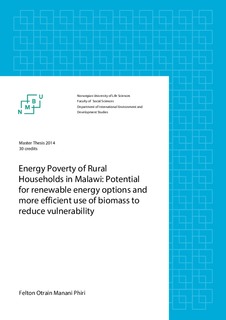Energy poverty of rural households in Malawi : potential for renewable energy options and more efficient use of biomass to reduce vulnerability
Master thesis
Permanent lenke
http://hdl.handle.net/11250/279307Utgivelsesdato
2015-03-16Metadata
Vis full innførselSamlinger
Sammendrag
Most of the people in Malawi live in rural areas and are poor, depend on rain-fed subsistence agriculture and use traditional biomass as a source of energy. In the face of changing climate this dependence on rain-fed agriculture and traditional biomass makes them to be more vulnerable. Furthermore, reliance on biomass as a source of energy degrades the environment and also cause human suffering thereby increasing their vulnerability. A number of interventions are being put in place by Malawi government and other stakeholders to reduce vulnerability of the rural poor. One of such is rural electrification using stand-alone renewable energy technologies such as solar home systems which are hoped to positively transform livelihoods through provision of efficient and reliable energy.
This study explores the potential for using renewable energy options in reducing people’s vulnerability and also how efficient use of biomass can reduce vulnerability and limit deforestation in Malawi. The research focuses on solar energy and efficient use of biomass through improved cookstoves. The issue of reducing vulnerability is addressed by looking at how use of solar energy and improved cookstoves improve people’s adaptive capacity. The study also looks at whether Malawi’s current energy policy promotes use of renewable energy. It uses Sustainable Livelihoods Framework by DFID.
The study is carried out in Chitala and Chimonjo villages, Salima district, Malawi. The sample is made of beneficiaries of the solar electrification project that was implemented in the two villages by the Barefoot College, India, and relevant key informants. The study uses mixed methods research in data collection and analysis.
The study shows that use of solar energy in the two villages has improved the health, income, education, and social life of participants. It also shows that both solar energy and improved cookstoves have environmental benefits. Furthermore, Malawi’s current energy policy has increased access to and use of renewable energy.
The paper concludes that use of solar energy and efficient use of biomass reduces people’s vulnerability to climate change. Efficient use of biomass has been found to reduce deforestation in Malawi. Furthermore, both solar energy and improved cookstoves mitigate climate change. Lastly, Malawi’s current energy policy promotes use of renewable energy.
Utgiver
Norwegian University of Life Sciences, Ås
Med mindre annet er angitt, så er denne innførselen lisensiert som Navngivelse-Ikkekommersiell-IngenBearbeidelse 3.0 Norge
Beslektede innførsler
Viser innførsler beslektet ved tittel, forfatter og emneord.
-
Fornybar energi vs. fossil energi : en empirisk analyse av aksjefond og indekser innenfor fornybar energi og fossil energi, og hvordan disse investeringene blir påvirket av oljepris
Farnes, Vibeke Andrea Haram (Master thesis, 2015-10-08)Formålet med denne oppgaven er å se om det finnes noen forskjell i risikojustert ytelse for investeringer i selskaper som driver sin virksomhet innenfor fornybar energi og fossil energi i perioden januar 2009 til desember ... -
Integrating renewable energy into Nigeria's energy mix : implications for Nigeria's energy security
Obideyi, Oluwatoni Onyeka (Master thesis, 2017)With increased awareness in the importance of energy to economic and social development, the need to attain energy security has increasingly become a paramount factor in the energy agenda of countries. To expand their ... -
Guarantees of origin for electricity - an analysis of its potential to increase new renewable energy in the North European energy system
Martinsen, Thomas; Mouilleron, Marine (MINA fagrapport;67, Report, 2020)The guarantee of origin scheme (GO) has been criticized for its insignificant impact on the development of new renewable energy and the contribution to reducing CO2 emissions. The reason is that sales of GO from old ...

